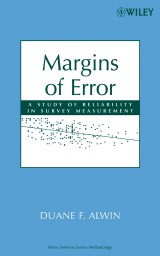Details

Margins of Error
A Study of Reliability in Survey MeasurementWiley Series in Survey Methodology, Band 547 1. Aufl.
|
122,99 € |
|
| Verlag: | Wiley |
| Format: | |
| Veröffentl.: | 09.07.2007 |
| ISBN/EAN: | 9780470146309 |
| Sprache: | englisch |
| Anzahl Seiten: | 408 |
DRM-geschütztes eBook, Sie benötigen z.B. Adobe Digital Editions und eine Adobe ID zum Lesen.
Beschreibungen
<b>Enhance the quality of survey results by recognizing and reducing measurement errors.</b> <p>Margins of Error: A Study of Reliability in Survey Measurement demonstrates how and hwy identifying the presence and extent of measurement errors in survey data is essential for improving the overall collection and analysis of the data. The author outlines the consequences of ignoring survey measurement errors and also discusses ways to detect and estimate the impact of these errors. This book also provides recommendations of improving the quality of survey data.</p> <p>Logically organized and clearly written, this book:</p> <ul> <li> <div>Deconstructs the data gathering process into six main elements of the response process: question adequacy, comprehension, accessibility, retrieval, motivation, and communication</div> </li> <li> <div>Provides an exhaustive review of valuable reliability estimation techniques that can be applied to survey data</div> </li> <li> <div>Identifies the types of questions and interviewer practices that are essential to the collection of reliable data</div> </li> <li> <div>Addresses hypotheses regarding which survey questions, sources of information, and questionnaire formats produce the most reliable data</div> </li> </ul> <p>In conjunction with research data gathered on nearly 500 survey measures and the application of an empirical approach grounded in classical measurement theory, this book discusses the sources of measurement error and provides the tools necessary for improving survey data collection methods.</p> <p>Margins of Error enables statisticians and researchers in the fields of public opinion and survey research to design studies that can detect, estimate, and reduce measurement errors that may have previously gone undetected. This book also serves as a supplemental textbook for both undergraduate and graduate survey methodology courses.</p>
Preface. <p>Acknowledgements.</p> <p>Foreward.</p> <p>1. Measurement Errors in Surveys.</p> <p>2. Sources of Survey Measurement Error.</p> <p>3. Reliability Theory for Survey Measures.</p> <p>4. Reliability Methods for Multiple Measures.</p> <p>5. Longitudinal Methods for Reliability Estimation.</p> <p>6. Using Longitudinal Data to Estimate Reliability Parameters.</p> <p>7. The Source and Content of Survey Questions.</p> <p>8. Survey Question Context.</p> <p>9. Formal Properties of Survey Questions.</p> <p>10. Attributes of Respondents.</p> <p>11. Reliability Estimation for Categorical Latent Variables.</p> <p>12. Final Thoughts and Future Directions.</p> <p>Appendix.</p> <p>References.</p> <p>Index.</p>
"For those who are engaged in survey work or gathering other data by asking questions of human beings, Margins of Error is a well-written book that can be highly recommended." (<i>Technometrics</i>, May 2008) <p>"The last chapter, titled Final Thoughts and Future Directions, is an excellent ending for the book. Experts of survey research could begin by reading that chapter first, as it give the most important points of the book in a nutshell and refers nicely back to the previous chapters. In addition, it includes precious thoughts and ideas for future research. experience talks in this book. Truly recommended." (<i>International Statistical Review</i> Aug 2008)</p>
<b>Duane F. Alwin, PHD</b>, is McCourtney Professor of Sociology and Demography and Director of the Center on Population Health and Aging at Pennsylvania State University. In addition to a concentration on survey methodology, his research interests include a wide range of phenomena concerned with the connection of human development and social change, as well as the impact of demographic and historical processes on individual cognitive, ideological, and attitudinal development. Dr. Alwin has published extensively in social science literature and is the recipient of more than two dozen prestigious awards, grants, and special university honors.
<b>Enhance the quality of survey results by recognizing and reducing measurement errors.</b> <p>Margins of Error: A Study of Reliability in Survey Measurement demonstrates how and hwy identifying the presence and extent of measurement errors in survey data is essential for improving the overall collection and analysis of the data. The author outlines the consequences of ignoring survey measurement errors and also discusses ways to detect and estimate the impact of these errors. This book also provides recommendations of improving the quality of survey data.</p> <p>Logically organized and clearly written, this book:</p> <ul> <li> <div>Deconstructs the data gathering process into six main elements of the response process: question adequacy, comprehension, accessibility, retrieval, motivation, and communication</div> </li> <li> <div>Provides an exhaustive review of valuable reliability estimation techniques that can be applied to survey data</div> </li> <li> <div>Identifies the types of questions and interviewer practices that are essential to the collection of reliable data</div> </li> <li> <div>Addresses hypotheses regarding which survey questions, sources of information, and questionnaire formats produce the most reliable data</div> </li> </ul> <p>In conjunction with research data gathered on nearly 500 survey measures and the application of an empirical approach grounded in classical measurement theory, this book discusses the sources of measurement error and provides the tools necessary for improving survey data collection methods.</p> <p>Margins of Error enables statisticians and researchers in the fields of public opinion and survey research to design studies that can detect, estimate, and reduce measurement errors that may have previously gone undetected. This book also serves as a supplemental textbook for both undergraduate and graduate survey methodology courses.</p>
Diese Produkte könnten Sie auch interessieren:

Nonparametric Regression Methods for Longitudinal Data Analysis

von: Hulin Wu, Jin-Ting Zhang

135,99 €

Statistics and the Evaluation of Evidence for Forensic Scientists

von: Colin Aitken, Franco Taroni

103,99 €














